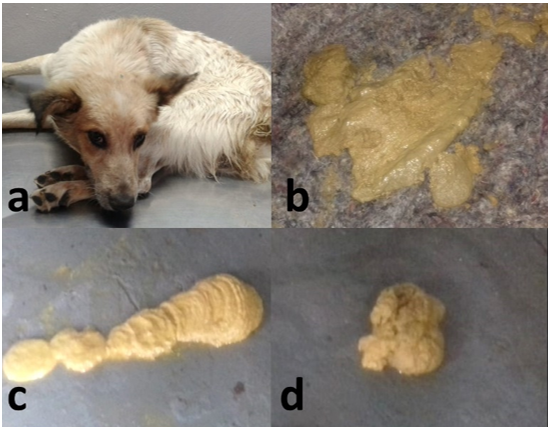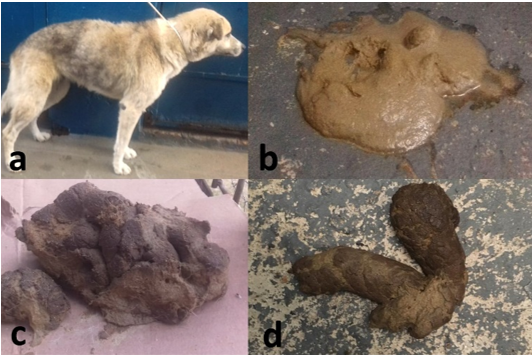REGISTRO DOI: 10.5281/zenodo.10864574
Isamery A. Machado1
Edmar Freitas2
Emerson Legatti3
Jean F. Joaquim
Fernando Carmona Dinau1
Vivian G. Suarez Arias1
Noeme S. Rocha1
Abstract
Canine gastroenteritis is one of the most common causes of clinical casuistry, being diarrhea its typical manifestation. It is increasingly important to reduce the indiscriminate use of medications to compensate for the progressive increase in antimicrobial resistance (AMR), therefore, it is necessary to investigate new technologies that can be used on gastrointestinal problems in dogs. Essential oils such as carvacrol are a natural alternative used in the management of gastroenteritis, with modulating and anti-inflammatory properties on the intestinal microbiota. Our study aimed to evaluate the innovative effects of a commercial product based on essential oils (Diageltm)on diarrhea caused by canine gastroenteritis. Two male canines of undefined breed with diarrheal gastroenteritis belonging to the Dog Kennel Alemiggiolaro in Botucatu-SP, Brazil were analyzed. Each animal underwent clinical and laboratory evaluation, which included a complete blood count, polymerase chain reaction (PCR), and microbiological culture. One of them received a diagnosis of Canine Distemper in a PCR exam; and the other was diagnosed with Escherichia coli, via microbiological culture. The veterinarian then treated the dogs with Diageltm regardless of the viral or bacterial diagnosis. Positive effects were determined when using Diageltm in dogs with diarrhea. The tested product can be recommended as an alternative in the treatment considering the problems of bacterial resistance.
Keywords: Canine. Carvacrol. Bacterial resistance.
BACKGROUND
Canine gastroenteritis is one of the most common causes of clinical casuistry, being diarrhea its typical manifestation. 10 Among principal etiological agents, those of infectious origin such as viruses, bacteria and parasites prevail. 4
However, the regular use of drugs can cause toxic effects and generate multi-resistance in pathogens. The World Health Organization (WHO) and Pan American Health Organization (PAHO) declared the Antimicrobial Resistance (AMR) a threat to public health, as indiscriminate prescription is one of the most frequent causes of morbidity and mortality in humans and animals.9 An increase in antibiotic-induced dysbiosis has also been shown in animals and humans, due to the implementation of antimicrobials that can be harmful to the intestinal microbiota, leading to a decrease in beneficial bacteria for the organism and favoring the proliferation of intestinal pathogens, which can induce gastrointestinal diseases. 12 Therefore, there is a greater interest in finding alternative ways of dealing with enteropathies that have fewer side effects. 2, 3
In veterinary medicine, studies had shown the action of essential oils as an alternative to the use of antibiotics. 5 Carvacrol, also called cymophenol is one of these examples, being a naturally occurring phenolic monoterpenoid and cymene derivative present in Origan (Oreganum vulgarea) and Thyme (Thymus vulgaris). 5 having anti-oxidant, antiseptic, anticarcinogenic, anti-inflammatory, antidiabetic role, immunomodulatory, antimicrobial activity, antispasmodic, antibacterial, antifungal and growth promoter, both in vivo and in vitro studies. 3, 5, 7, 11, 13, 14
Carvacrol antibacterial effect is due to the ability to inhibit bacterial adhesion, invasion and biofilm formation; in a study associating the biological properties of Carvacrol against the growth of E. coli, the ability to inhibit biofilm development was observed, as this monoterpene acts by penetrating the structure of the bacterial cell membrane, deregulating the pH and causing the loss of intracellular homeostasis. 1
Therefore, as an alternative approach, the Diageltm product based on Carvacrol is made from natural ingredients with no known side effects. Each formula is safe for dogs or cats of any age. This compound helps to quickly restore gastrointestinal function. The active ingredient for dogs is Carvacrol, responsible for the biological activities of oregano. 6
The therapeutic study of Carvacrol is extremely important to minimize the use of antibiotics and antifungals with the aim of avoiding the growth of the antimicrobial resistance scenario in both human and veterinary medicine. 2, 15 In this work we show two animals with enteropathies in which Diageltm, a drug based on Carvacrol, helped to improve the clinical condition.
CASE REPORT
We carried out a report of two cases of male dogs of undefined breed with diarrheal gastroenteritis belonging to the Dog Kennel Alemiggiolaro in Botucatu-SP, Brazil. Each animal with diarrhea was subjected to a clinical evaluation, presenting several similar symptoms such as apathy, weakness, mild dehydration with feces of a pasty to liquid consistency, one of the animals presented ataxia of the posterior members . Subsequently, a blood sample was taken to perform a complete blood count and PCR to evaluate the patient’s physiological condition and diagnose a viral infectious disease. Fecal samples were also taken for coproparasitological diagnosis and microbiological culture. The samples were taken to two laboratories, one clinical and the other for molecular diagnosis.
Most of the values expressed in the erythrogram and leukogram of the dogs evaluated were within normal ranges. One of the patients in addition the microbiological culture of that animal was positive for classic polyvalent E. coli B, with resistance to all the medications tested, on the other hand this patient presented a negative PCR for distemper, coronavirus and parvovirus . Finally, the second animal evaluated had a negative microbiological culture for bacteria and a positive PCR for distemper.
Veterinarian treated the dogs after clinical analysis with Diageltm. Finally, the faeces of the dogs were classified using tables, during time zero (at the visit) 12, 24, 36 and 48 hours after the application of the product. The stool score ranged from one (1) Soft and flexible, which stays fit but leaves no residue, to six (6) Little or no texture, puddle of water (Fig 1). Every time a dog goes from a score of 4 to 3, the improvement will be considered significant. The same with the rest of the scores.
Fig 1. Stool classification (To score dog’s poop using the number below. 1. Soft and pliable, holds form, but leaves no residue, 2. Sticky, holds form, leaves aslight residue, 3. Moist, leaves a definite residue, 4. Little form is visible, very droopy pile, 5. Little to no form visible, textured pile, 6. Little to no texture, watery puddle)
RESULTS AND DISCUSSION
Positive anti-diarrhea effects were obtained in the 2 animals tested after administering Diageltm . All animals independent of diagnosis obtained significant improvements when looking at the stool classification table after 24 hours.
Canine distemper presented in figure 2, is one of the most frequent viral diseases in domestic canines, typically characterized by nervous clinical signs, however, it can present extraneural stages, such as gastroenteric symptoms, due to the alteration of the patient’s immune system.8 Through our study , it was demonstrated that regardless of the etiology, in the case of gastroenteritis, treatment with Diageltm was effective in improving the diarrhea, changing the consistency of the feces of the affected animal in a period of 24 hours.

Fig 2. Dog positive for Canine distemper virus (a. Canine physical condition b. Feces during time 0, c. Faeces during time 24, d. Faeces during time 48)
The dog number 2 , presented in figure 3 was diagnosed with Escherichia coli, with resistance of most of the antimicrobial tested, changes in the consistency of the canine feces was observed at 12, 24 and 48 hours. Based on the clinical evaluation, our data suggests that the antimicrobial effect of carvacrol essential oil managed to inhibit bacterial proliferation and considerably reduce infectious diarrhea in the patient with E. coli treated with Diageltm .
Experimental studies in mice have confirmed the ability of essential oils to generate a protective, anti-inflammatory effect and promote recovery of the gastrointestinal tract.2, 7 In both patients treated with carvacrol there was an improvement in stool consistency, which is related to the protective effect of essential oils on the gastrointestinal microbiota. Therefore, it is suggested that Diageltm therapy based on essential oils was a positive alternative treatment that managed to regulate inflammation and reestablish the intestinal microbial flora of the dogs evaluated.
Positive effects were determined when using Diageltm in dogs with diarrhea, It is recommended as an alternative in the treatment considering the problems of bacterial resistance.

Fig 3. Canine positive for polyvalent classical E.Coli (a. Canine physical condition b. Feces during time 0, c. Faeces during time 24, d. Faeces during time 48)
Acknowledgment
The authors express gratitude to all the support staff at the Dog Kennel Alemiggiolaro Botucatu-SP, Brazil for their invaluable collaboration during the observation of the evaluated dogs. Similarly, we thank the company To the Van Beek Natural Science Company for financing the pilot test.
Reference
1 Asadi, S., Nayeri-Fasaei, B., Zahraei-Salehi. Antibacterial and anti-biofilm properties of carvacrol alone and in combination with cefixime against Escherichia coli. BMC Microbiol. 2023;23:55.
2 Bukovská A, Cikos S, Juhás S, Il’ková G, Rehák P, Koppel J. Effects of a combination of thyme and oregano essential oils on TNBS-induced colitis in mice. Mediators Inflamm. 2007;2007:23296.
3 Collis RM, Burgess SA, Biggs PJ, et al. Extended-Spectrum Beta-Lactamase-Producing Enterobacteriaceae in Dairy Farm Environments: A New Zealand Perspective. Foodborne Pathog Dis. 2019;16:5-22.
4 Dema A, Tallapally MR, Ganji VK, et al. A comprehensive molecular survey of viral pathogens associated with canine gastroenteritis. Arch Virol. 2023;168:36.
5 Imran M, Aslam M, Alsagaby AS, et al. Therapeutic application of carvacrol: A comprehensive review. Food Sci Nutr. 2022;10:3544-3561.
6 Mączka W, Twardawska M, Grabarczyk M, Wińska K. Carvacrol-A Natural Phenolic Compound with Antimicrobial Properties. Antibiotics (Basel). 2023;12:824.
7 Minaiyan M, Ghannadi AR, Afsharipour M, Mahzouni P. Effects of extract and essential oil of Rosmarinus officinalis L. on TNBS-induced colitis in rats. Res Pharm Sci. 2011;6:13-21.
8 Menezes KMF, Filho GD de S, Damasceno AD, Souza M, Torres BBJ. Epizootiology of canine distemper in naturally infected dogs in Goiânia, Brazil. Cienc Rural. 2023;53:e20220166.
9 Pan American Health Organization. Annual report of the network for monitoring/surveillance of antibiotic resistance and healthcare associated infections. Revista de patologia tropical. 2013;42.
10 Robinson NJ, Dean RS, Cobb M, Brennan ML. Investigating common clinical presentations in first opinion small animal consultations using direct observation. Vet Rec. 2015;176:463.
11 Spisni E, Petrocelli G, Imbesi V, et al. Antioxidant, Anti-Inflammatory, and Microbial-Modulating Activities of Essential Oils: Implications in Colonic Pathophysiology. Int J Mol Sci. 2020;21:4152.
12 Stavroulaki EM, Suchodolski JS, Xenoulis PG. Effects of antimicrobials on the gastrointestinal microbiota of dogs and cats. Vet J. 2023;291:105929.
13 Swamy MK, Akhtar MS, Sinniah UR. Antimicrobial Properties of Plant Essential Oils against Human Pathogens and Their Mode of Action: An Updated Review. Evid Based Complement Alternat Med. 2016;2016:3012462.
14 Silva ER, de Carvalho FO, Teixeira LGB, et al. Pharmacological Effects of Carvacrol in In vitro Studies: A Review. Curr Pharm Des. 2018;24:3454-3465.
15 Yap PS, Yiap BC, Ping HC, Lim SH. Essential oils, a new horizon in combating bacterial antibiotic resistance. Open Microbiol J. 2014;8:6-14.
1Department of Veterinary Clinic, Sao Paulo State University (UNESP), Botucatu, Brazil
2 Van Beek Natural Science
3 Dog Kennel Alemiggiolaro Botucatu-SP, brazil.
4Ministry of Agriculture, Cattle, and Supplying SP, Brazil.
